Etiquette: dos and don’ts in New Caledonia
For those who have never visited New Caledonia or a French-speaking country, there are a few tips and tricks to keep in mind when interacting with the local population in New Caledonia.
First of all, New Caledonia is a French territory and the official language is French (though 28 distinct Kanak languages are spoken here, in addition to Indonesian, Vietnamese, Tahitian, Wallisian, and Chinese).
Relatively little English is spoken in Nouméa and even less is spoken outside the capital and on the Loyalty Islands, where the percentage of the Melanesian population is much higher (the Kanaks constitute 94% of the population in the Loyalty Islands, 74% in the North Province and 27% in the South Province). By way of example, far more English is spoken in Paris than in Nouméa. The great thing here, though, is that people are very warm and patient, so mistakes are just seen as steps towards connecting. A list of helpful French phrases to know when you arrive are included at the end of this post as a starting point.
Second, the population is composed as following:
In 2009, 40.3% of the population reported belonging to the Kanak [or Melanesian] community, 29.2% to the European community and 8.7% to the community originating from Wallis and Futuna. The remaining identified communities represented 7.3% of the population, and included Tahitians (2.0%), Indonesians (1.6%), Vietnamese(1.0%), Ni-Vanuatu (0.9%) other Asian (0.8%) and other (1.0%). 8.3% belonged to multiple communities, 5% declared their community as “Caledonian”, 1.2% did not respond.[53]
So when one discusses etiquette, it is important to keep in mind that we have several different cultural groups (in addition to upwards of 30 languages) – which require similar, and yet, different sensitivities. When in doubt, it is best to smile, speak quietly and show respect (in terms of physical space, how you gesture and in the way you dress). But let’s dig deeper into some of those tips and tricks.
Meeting and greeting
When meeting both Europeans and Kanaks (or Melanesians), you can make eye contact and extend your hand in a handshake. Melanesians may not return your gaze, and may shake your hand gently, and both of these gestures are out of politeness.
Note that Melanesians will say hello to you on the street and on the roads, either verbally or by waving. Again, this is considered polite, and it is respectful of you to return their greeting.
The French, among family and friends, usually greet each other by kissing each other on both cheeks. They also do so upon saying goodbye. One does not however “fait les bises” in work situations (unless the colleagues know each other very well).
When greeting both Europeans and Melanesians face to face, maintain a respectful distance (the distance of a handshake). Do not attempt to hug a European or Kanak, unless you are very, very close – and even then, bear in mind that this may make them uncomfortable.
It is best to avoid touch for emphasis or to establish trust. Melanesians consider hair sacred, so it is best to ask before you touch someone’s hair.
La Coutume
You may have heard of “la coutume”, which is an introduction and the offering of a small gift when you enter tribal lands in New Caledonia.
When Kanaks enter the home of a chief, they will offer a small token as a sign of respect and to introduce themselves. Food, a few metres of textiles (cloth, easily found in Chinatown in Nouméa), money or a packet of cigarettes are the traditional and contemporary offerings, and if you’re given the rare privilege of being invited to a tribal home, you should respect la coutume by bringing a gift. When you want to camp on a clan’s ground or visit a site, it’s wise and courteous to introduce yourself to the chief, if possible, or at least to someone in the clan.
Proper names for major ethnicities
There has been much debate over whether or not to use the word “Kanak” when referring to the native people of New Caledonia. Some have said:
- My friend prefers me to use the word Melanesian or Indigene rather than Kanak.
- I only use the word Kanak when referring to an object such as a piece of art. I never call a person a Kanak.
- Kanak is totally acceptable. I have been using Kanak with my Melanesian friends for more than 20 years.
I use Kanak and Melanesian interchangeably in both written and verbal communications, as a form of respect (Melanesian) and compassion (Kanak) for the culture. The few Melanesian friends and people I have met refer to themselves as Kanaks and prefer that I also do so. I see both terms regularly in the press, though Kanak seems to be the preferred term.
With regard to the Europeans on the island, it is recommended to use the word “Caledonian” instead of “Caldoche.” The Lonely Planet Guide says “the word Caldoche was initially used as an insult and there are still some people not fond of the term.”
Those recently arrived from France on short-term postings of 2-3 years are called “Metropolitans” or “Metros”.
Showing respect for elders and females
Respect is demonstrated in different ways in various cultures. Dressing modestly and waiting to be invited into a conversation are some of the ways South Pacific cultures show respect.
Kanaks show respect in personal interactions. Certain relationships involve compulsory familiarity. One respects maternal relatives, one’s elders, and aged persons. Women must respect men by maintaining spatial distance, keeping silent, and using special terms of politeness. Familiarity allows people to stand close together, touch, and talk together. In public places, Kanaks adopt a discreet and subdued attitude, avoiding excessive speaking or gesticulating, which are considered rude. Contact with strangers is marked by gifts and formal speech. Strangers are observed attentively from afar and judged on the basis of their behavior.
Dining etiquette
When invited to dinner for the first time at a private French home, a bouquet of flowers and/or a bottle of wine is usually presented to the hostess. If you have been invited to a Kanak home, you should also bring a small gift. If you are invited on the fly to join a Melanesian for a cup of tea or coffee, a simple “thank you” is acceptable.
It is best to arrive on time when invited somewhere by both Europeans and Kanaks.
With regard to eating and conversing, French etiquette rules should be followed. These include serving women first, waiting for the hostess/host to take the first bite, using cutlery from the outside in, keeping both hands on the table (in view) and not interrupting others. If you enjoy your food, do say so, thanking both the host and hostess.
Alcohol consumption should be moderate at most.
As most Caledonians rise early, it is also advisable not to overstay your welcome.
See above for how to greet and say goodbye to your hosts.
Dos and don’ts
It is part of tribal life to greet passers-by, even if you’re inside a vehicle going past pedestrians – you’ll soon find you do a lot of waving (especially outside Nouméa).
The ancient Kanak customary law of offering visitors food persists. Arriving in a village, you may be invited to share a cup of tea or coffee or even an entire meal in the house of someone you met only 10 minutes earlier. Nothing more than a “thank you” is expected in return if you are just passing through. However, if you stay a day or so, out of politeness to their custom you should present your host with some food.
Do not enter villages wearing just swimwear or revealing shorts. Women should make sure their skirts or pants are of a decent length and men shouldn’t be bare-chested. Dressing in revealing clothes is okay around the beach suburbs of Nouméa, but everywhere outside the capital it’s frowned upon and on Isle of Pines, by decree of the chief, such clothes are strictly illegal (except at tourist beaches). Going topless is fine on Nouméan beaches but it’s not accepted outside the capital.
Traditional Kanak cemeteries are the abode of the ancestors and, unless you have permission from tribal elders, you should not enter these places.
Visitors are expected to ask permission of local people before exploring forests, swimming in waterholes or wandering around any tribal areas.
We also learned recently that you are not to photograph the huts in Lifou without permission, as these are sacred. As a general rule, it is best to ask permission before photographing Kanak children and adults.
Building trust
The best ways to build trust with people in New Caledonia, be them Europeans, Melanesians and others are to:
1. Remain respectful at all times.
2. Show humility, as a visitor here.
3. Listen to, and remain open to, what the locals have to share with you.
You will break trust if you:
1. Act disrespectfully.
2. Speak unkindly of the locals (Europeans and Melanesians).
3. Do not follow through on your commitments or do the opposite of what you have said you will do.
A few common phrases that are helpful to know upon arrival
| Hello/Good morning | Bonjour | [bone-JURE] (the “n” in bone is silent and the “j” is pronounced like “s” in “pleasure”) |
| Good evening | Bonsoir | [bawn-SWARR] |
| Goodbye | Au revoir | [oh ruh-VWARR] |
| Yes | Oui | [wee] |
| No | Non | [nohn] |
| Maybe | Peut-etre | [PEUH-tetrr] |
| Please | S’il vous plait | [see voo PLAY] |
| Thank you | Merci | [MAIR-see] |
| You’re welcome | Je vous en prie | [jeuh VOOZ ohn PREE] |
| Excuse me | Excusez-moi | [EX-quoo-zay MWAH] |
| I’m sorry (Forgive me) | Pardon | [PAR-dohn] |
| How are you? | Comment allez-vous? | [KOM-mohn TAH-lay VOO?] |
| I’m fine, thanks. | Je vais bien, merci. | [bee-ehn MAIR-see] |
| I’m from … | Je viens de … | [jeuh VI-ehn deuh …] |
| I understand | Je comprends | [jeuh cawm-PRAWN] |
| I don’t understand | Je ne comprends pas | [jeuh neuh cawm-PRAWN pah] |
| Do you speak English ? | Parlez-vous anglais ? | [PAR-lay VOO ahn-GLAY ?] |
| I’d like … | Je voudrais … | [jeuh VOO-dray] |
| Where is … | Ou est … | [oo way…] |
| I’m looking for … | Je cherche … | [jeuh SHERSH …] |
| Help ! | Au secours ! | [oh SKOOHR!] |
==========
Sources used for this post:
Gagnon, Jo-Ann (2009), The New Caledonia Newcomer’s Guide.
Logan, Leanne and Geert Cole (2001), New Caledonia, Lonely Planet Publications.

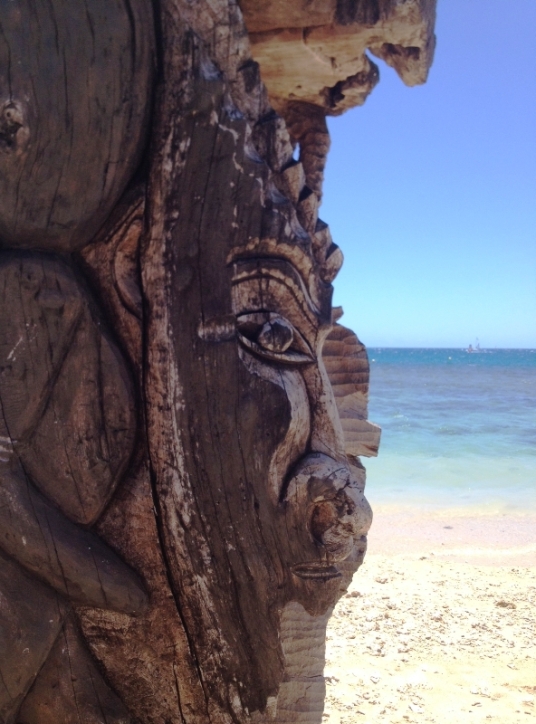
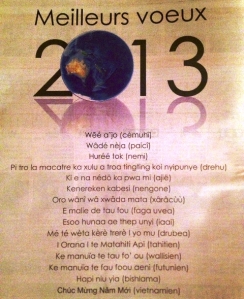
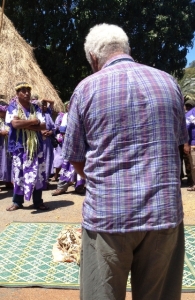
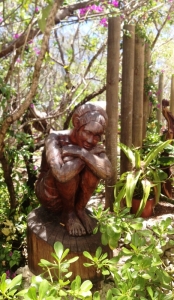
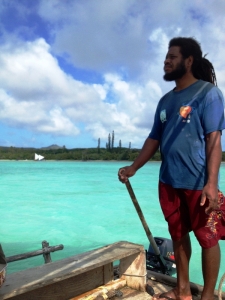
Pingback: Family life and gender roles in New Caledonia | New Caledonia Today
Pingback: Tribal ways in New Caledonia | New Caledonia Today
Pingback: Whale watching season in New Caledonia | New Caledonia Today
Pingback: We walk backwards into our future – Maori Proverb | randomkindnessblog
What is the kanak word for hello?
The most common way is “Bozu”, but there are over 30 Kanak dialects. If you are from Belep (in the North), for example, it is “Boyu”. Hoping this helps!
Really enjoy reading your logs. We will be visiting New Caledonia from 9 to 23 October. This is the school holidays. Can we expect accommodation to be heavily booked. We will be happy to stay in tribal accommodation but would prefer bungalow type accommodation. We will be visiting from Australia and have very very limited French.
Hi Chris – I think you’ll still be able to book accommodation for that period. Have you done so already? Where will you be going in New Caledonia? If possible, it would be best to book now, just to be on the safe side. If you need any help, please feel free to email me at julie.harrisguiader@gmail.com
A nitpick, but the first syllable of “Bonjour” is not “bawn”. It’s like saying “bone” but without the “n” if that makes sense.
Many thanks, John. I’ve now corrected the text as you suggest. You are right, of course. 🙂 – Julie
Pingback: Tribute to a life in New Caledonia | New Caledonia Today
Hi Julie, Thank you for creating such a helpful blog. I need your help. I will be in Noumea next week and to be honest, I am worried that we tourists are not welcome. Seems that food/drink is expensive and of a low quality (unless you enjoy eating hamburgers for a week!), the mobile network is expensive and so-called “Free” Wi Fi too slow to be of any use. It sounds like the locals are not very interested in welcoming visitors (speak French or we will ignore you) unless they arrive by ship and leave quickly.
I love France and the French people. I do not need luxury but I do need a decent coffee and to eat when hungry without worrying about my life’s savings being at risk.
Have I made a terrible mistake planning a trip to New Caledonia should I stop searching the Internet and expect a surprisingly hospitable visit? I would be grateful for your advice.
Hi Kevin – You have not made a terrible mistake, I promise you. New Caledonia is beautiful and you will be arriving at a fantastic time. The weather is getting warmer and the colors brighter. If you love the French and do not need luxury, you will be far from disappointed. I find New Caledonia much friendlier than France, but if you have never been to a French-speaking country, the cultural differences can come as a surprise. But it sounds as if you are accustomed to these. To my mind, you will have a wonderful visit. You can eat fresh fish, salads and baguette without breaking your budget. Wifi works very well in many cafes and restaurants (free). Malongo at Anse Vata is one such place. Please stop worrying. If I can help in any other way, please let me know. Kind regards – Julie
Im off to noumea in sept, im learning the language and the way u have told how to say words is great thanks..already booked the snorkel with roberta & valerie au revoir
Excellent – Have a great time! – Julie
Hi Julie,
Do you know any websites where I can learn Kanak dialects? Going down the lists of links can be time consuming and oftentimes they redirect to something totally different.
Oléti!
Elodie
One more question s’il vous plait, and anyone can answer as far as I’m concerned. I’d like to know how the social climate and cost of living are in New Caledonia. It seems, it depends upon who I ask. One person tells me it is getting very expensive. Another will say, it’s not expensive at all. Maybe one is more wealthy than the other, so he doesn’t notice as much. One will say crime is getting worse lately. There are various stories that the two main groups don’t like each other (French and Melanesians or Kanaky people), or the Kanaks don’t like the French. Maybe it depends on where you live, or how you perceive things. I don’t want to start a negative thread, I want to know because I’m very interested in this country and hope to live there or at least visit one day. I know all places have their problems or daily challenges, and some are better than others. It may be that I’d have to see for myself, but aside from common precautions and good sense, I’d like to know before I get there.
Merci
Mary
Hi Mary – You have put your finger on the pulse. Any place is as we perceive it. I think you should definitely visit and if you like it, you should plan a longer stay. I loved it from the beginning (as I wrote in my first blog, Sojourn in the South Pacific). My second stay, I discovered different parts of New Caledonia. But I love it, still. Yes, there is slightly more violence. Yes, racial tension seems to be increasing. Yes, it is expensive. But compared to other places in the world, it is still very much a paradise – for its non-commercialism, for its simplicity, for its pristine waters and beautiful countryside. I found the people very friendly (especially when I was friendly). I found ways around the high prices (I consumed less). I felt safe (and took precautions). Others may have different views – which I welcome – but if you ask me, I heartily encourage you to visit, with eyes and heart open. Hoping this helps – Julie
Thanks Julie,
Your optimistic but realistic perspective is very helpful. I still want to visit La Nouvelle Caledonie. I want to be positive. I’m sure there are places that are safer than others. I’ll look into the safer places.
Oleti,
Mary
I do hope you get there, Mary! We’ve just left it and I can tell you I miss it more than anything in the world. Noumea – and even the North – is safe. You’ll see. All the best to you – Julie
Hi Julie, appreciate the effort you have gone to with your blog, very informative. Hoping to be over there for a while soon, can you tell me what the Internet quality was like in Noumea, experience connecting and any advice on providers/requirements to connect etc?
Hope you don’t mind offering advice, it makes the process so much easier!
Thanks again,
Katrina
Hi Katrina – Thanks for your kind words. Internet quality is constantly improving in Noumea, and is already pretty good, if not expensive. You can buy Internet access for pennies on your mobile if you buy it for half an hour (not always-on 4G). At-home access is usually good. When I first arrived it was so slow I couldn’t stream video, which was frustrating, and skype calls were choppy. But they’ve gotten a lot better. There are a few providers who provide more or less the same thing for the same price. The providers I recall are Lagoon.nc and Can’l. See if you can find their sites on line. If not, let me know! And just for fun, I thought you’d like this: https://newcaledoniatoday.wordpress.com/2013/02/21/internet-trouble-in-new-caledonia-until-1-march/ Good luck! – Julie
Sounds…….challenging 🙂 thanks for the advice.
Hi Julie, I found your blog both interesting and informative as a sailing cruiser sailing these islands a second time now. However, there is one aspect to this that needs to be addressed, and that is what happens when we as tourists are treated poorly.
Ana and I arrived in Lifou where the people were incredibly friendly and had NO issue with us filming them, taking photographs and certainly no issue with photographing their huts. The folks were respectful to the extreme and we loved our stay there.
When we arrived at Mouli in Ouvea it was a different story. We are sailors having cruised all over the world for years on end now and having visited many folks on remote islands so we know how to respectfully approach locals and always understand we are on their turf ‘so to speak’.
However, in Ouvea, the chief was at a conference in Noumea and we were greeted by the spokesman of the village where we presented our gifts (La Coutume) and in addition he told us we had to pay for anchoring, walking on the beach, walking through town, swimming, diving and we had to be accompanied wherever we go.
We questioned this as no where have we read there is such a strict policy but the man became angry and even aggressive toward us as a result. We said we would leave and got up from our chairs edging our way out of his hut. Now I am from South Africa where tribal traditions vary and am very accustomed to working respectfully between the various locals, however, we have never experienced aggression on this scale – perhaps the man had one too many to drink.
As we left the hut, the chiefs son asked us to please return – we were reluctant to do so but at this the spokesman also became more humble.
We then went through a 20 minute process of apology – the spokesman says he has no idea why he felt such aggression. The folks also agreed they should not have asked us of all these things and that we must feel free to roam about the island and do all we want to do except a special request not to spear their fish – and we agreed to this.
Now what we have learnt after two seasons of cruising here, is that tourists should of course remain respectful to the extreme, but also be aware of their rights to visit locations and not be ‘bullied into a situation’ where we are ripped off as tourists, but to remain strong and correct in attitude as we exercise the rights to explore these islands having cleared in through French custom. There is a tendency for tourists to just accept the status quo, however we have found this sets a trend for locals to exploit tourists more and more and bad habits eventually creep in making it more difficult and unpleasant for those that follow.
We should remember the words of the great chief Tjibaou who warns the Kanak people to make sure that the tradition of La Coutume does not become a way of exploiting business from it, but to remain a welcoming tradition. We think there is a trend now, where a handful of ‘vocal Kanaks’ who are also politically motivated, are taking on a bad habit of placing more rules on territory in a bid to extract more money from the pockets of tourist, and when we ask the question of ‘why it is so’ they have found that by aggression they subdue foreigners – I fear to say that this is something we feel the authorities are not getting a grip on in a territory we consider the most beautiful cruising grounds in the world.
By example, we can raise the beautiful little atol of Beautemps-Beaupre where there is conflict between the locals as to who has the authority to allow visitors to that location. We follow the guide books and posts – we sail into St. Josephs to get permission from the local leader and are granted the rights. At Beautemps-Beaupre an angry ‘mob’ of youngsters (Kanaks) violently shout and gesture for the boats to leave and hen they do not the anchor chains are cut and the locals make it unpleasant to be there. Sailors as a result move along – the mobsters now see victory in aggression and the habit grows and spreads through the territory.
The same occurs on the very southern island of Ile Des Pins – one gets the permission from one group but another becomes aggressive because they want to exploit the island for their own business purposes.
Whilst I write these things, I am mindful that it is a very few number of locals engaged in this – they are ‘the mobsters’ spoiling it for the rest of the local people. We sail on toward other destinations, however, the word spreads and people become more wary of the attraction of visiting a free and natural paradise.
I hope you will share this – I hope tourists will see both sides to the coin and be more aware of their rights and to consider those to follow by being respectful but also not playing to the tune of the exploiters.
All our best and thanks for the awesome blog … we used your information to gain an understanding of the region …
Fair winds
Brent and Ana
SV Impi
Pingback: Fun family activities in New Caledonia | New Caledonia Today
thank you for your helpful information. I am going to New Caledonia next week 🙂
Excellent! Have a wonderful time! And if you think of it afterwards, I’d love to hear your thoughts about your time there. All the best – Julie
Hello or should I say Bonjour!
I am come to Noumea on the P & O Pacific Jewel in August 2017. I can’t wait!
I am a family historian and have discovered that my daughter has ancestors from Noumea. They were from France with the last name Lacoste. Is there a genealogy society there that might help me track down some information? I need someone who speaks English as my French is non existent.
Thank you.
Regards
Joanne
Hi Joanne – I’m afraid I do not know of an English-speaking genealogy society in New Caledonia. Would something like this help: https://familysearch.org/wiki/en/New_Caledonia_Genealogy ? Good luck! – Julie